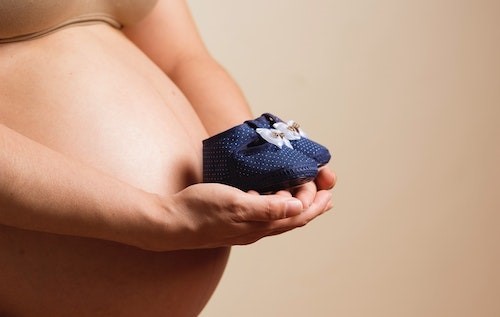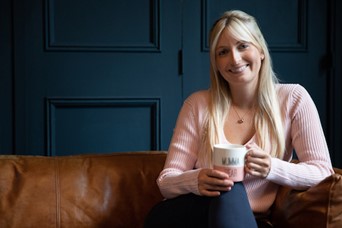Pregnant during Lockdown? Here's what you can and can't do
Pregnancy and Lockdown Restrictions
With a new National Lockdown announced yesterday in the UK, it's a challenging time to be pregnant. But it's still a joyous time to be celebrated.
It's important to understand what lockdown rules apply to you and your pregnancy as you are in a very special situation. There are also various things you can do to look after yourself and help prepare for the birth.
We asked Dr Ellie Rayner from The Maternity Collective to clarify the situation for pregnant women during this lockdown.

What is the current advice for pregnant women?
As a precaution, pregnant women have been included in the list of people at moderate risk (clinically vulnerable) of COVID-19 as pregnant women can sometimes be at more risk of viruses like flu. If you are pregnant, you should follow the latest guidance on staying alert and safe using social distancing, appropriate use of face coverings and avoiding anyone who has symptoms suggestive of coronavirus. This is particularly important if you are in your third trimester, which is more than 28 weeks pregnant.
How will lockdown restrictions affect my pregnancy?
Under current government guidance you are advised to stay home unless for a specific purpose. If you are staying inside more or not as active as you would be normally, then it is really important to make some small changes to stay well during this time. During pregnancy you are at greater risk of developing a blood clot than a non-pregnant person, so keep as mobile as you can and make sure to drink plenty of water to reduce your risk.
Vitamin D is made when our skin is exposed to sunlight. All pregnant and breastfeeding women need 10 micrograms of Vitamin D every day to help keep our bones and muscles healthy and you should consider taking a supplement for this. Normally we only recommend this during the autumn and winter months when we cover up more or spend more time indoors however, in light of the pandemic and restrictions, as you may have spent more time indoors than normal this year, we would encourage you start taking this. Taking a Vitamin D supplement is particularly important if you cover your skin for cultural reasons or have dark skin (such as women who are of African, African Caribbean or south Asian origin) or if you have a BMI (body mass index) >30, as you can be at greater risk of Vitamin D deficiency.
How can I stay active while pregnant during lockdown?
During lockdown, you are currently still able to leave your home to exercise either by yourself, with your household or support bubble, or with one other person from another household. Keeping active is an important aspect of any pregnancy and regular exercise is important for both yours and your baby’s wellbeing. It can give you more energy, improve your mood and sleep and can help reduce your risk of developing raised blood pressure or pregnancy diabetes (gestational diabetes).
It also helps you cope with labour and can make labour easier. With lockdown restrictions, some of your usual fitness classes or activities may be cancelled, but it is important to try and maintain a similar level of exercise to what you were previous undertaking. Walking, jogging, at home aerobics or pregnancy yoga are all safe. If you didn’t exercise very much before pregnancy, you can still start now with 15 minutes 3-4 times a week and increasing as you feel able.
How can I prepare for labour and birth during lockdown?
Preparing for labour, birth and the newborn period is a vital part of any pregnancy, particularly if you are first time parent. The COVID-19 pandemic and lockdown has undoubtably limited access to antenatal classes and expectant parent groups, particularly in light of pregnant women being placed in the moderate risk category. However, despite this, there are still lots of options for you online and in the safety of your own home to help you feel prepared and confident as you approach birth.
These options include online pre-recorded videos to watch at your leisure, zoom group classes or even private 1-2-1 sessions. There are also books and NHS recommended websites to provide written information during this time. If you are planning on using an online course, do your research and find a reliable antenatal class provider.
Unfortunately, antenatal education isn’t regulated, so although often given with good intention, information online may be inaccurate or out of date or from someone not qualified to advise about the topic. Ideally look for a course led by teachers who are qualified and practicing healthcare professionals in the NHS, as they will be most likely to be up to date with the current guidance and be in the best position to provide you with accurate and evidence-based labour and birth advice.
Should I still attend my Antenatal/Postnatal appointments during lockdown?
Antenatal and postnatal care is still vitally important for you and your baby and your local maternity unit will have made provisions to ensure they can still provide all of the necessary appointments you need. They will have put extra precautions in place to ensure they keep both you and your baby safe, as well as the staff working within the maternity unit. These appointments may be in a different place, or via a different method, such as video or telephone call appointment, but they are all necessary and something to look forward to.
If you are worried that you have symptoms of Covid-19, or that you have been in contact with someone that does, then call your maternity unit and discuss this and make a plan with them for your appointment. This may include attending a different area or rearranging for a different day.
What if I am worried about myself or my baby during lockdown?
Maternity care is still essential, and the NHS is working hard to ensure that services are running and have safeguards in place to make sure you can access the care that you need when you need it. Regardless of whether you are symptomatic of coronavirus, self-isolating or shielding, it is really important that if you do have any concerns about your health or pregnancy that you speak to your midwife or doctor as soon as possible. Please do not hesitate to call your local maternity unit if you have symptoms such as pain, bleeding, suspect your waters have broken or not feeling your baby move as much as normal, your maternity unit will be happy to advise and see you when needed.
If you do need any further information about current recommendations and advice regarding pregnancy and Covid-19, please see the Royal College of Obstetricians and Gynaecologists website or speak to your local maternity unit as they will able to advise you on update to date guidance for you area.
--------------------
About the Author
 Dr Ellie Rayner is a practicing Obstetrician and Gynaecologist and founder of The Maternity Collective.
Dr Ellie Rayner is a practicing Obstetrician and Gynaecologist and founder of The Maternity Collective.
She is the only Obstetrician to offer private and group, expert-led Antenatal and Hypnobirthing Classes both Online and face-to-face. She is passionate about providing parent-centred, evidence-based care for all pregnancies and supports all methods of birth.
The Maternity Collective provide complete online antenatal and birth preparation courses led by a team of NHS healthcare professionals, including a Community Midwife, Obstetrician, Internationally Board-Certified Lactation Consultant (IBCLC) and Newborn Sleep and Behaviour Expert. Their 7-hour online course of 37 videos has been undertaken by more than 4200 parents to date and has fanatic reviews.